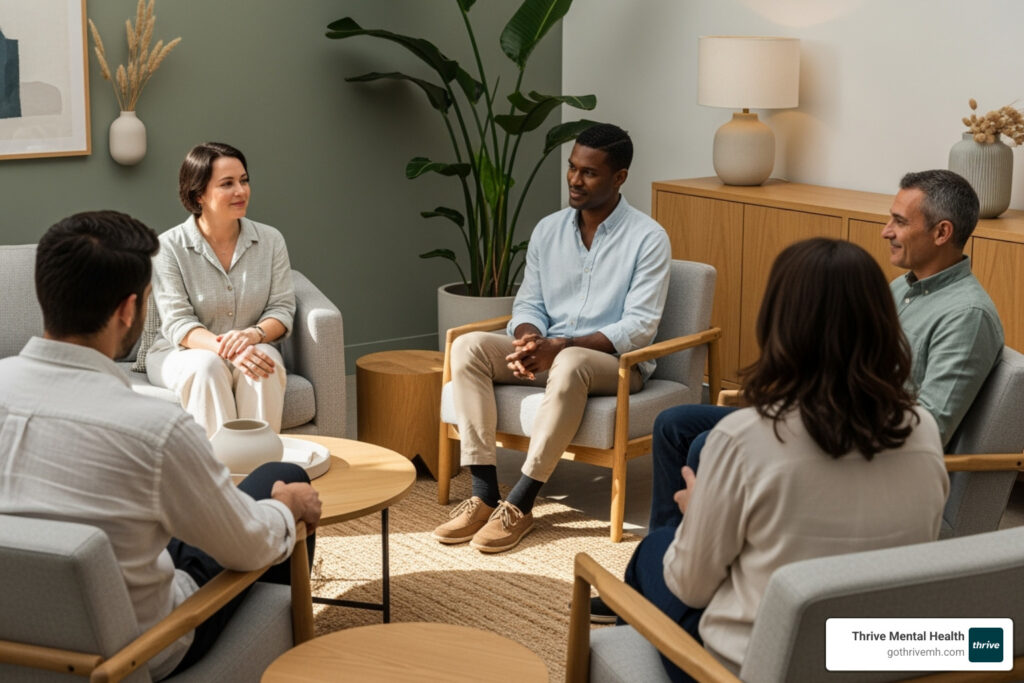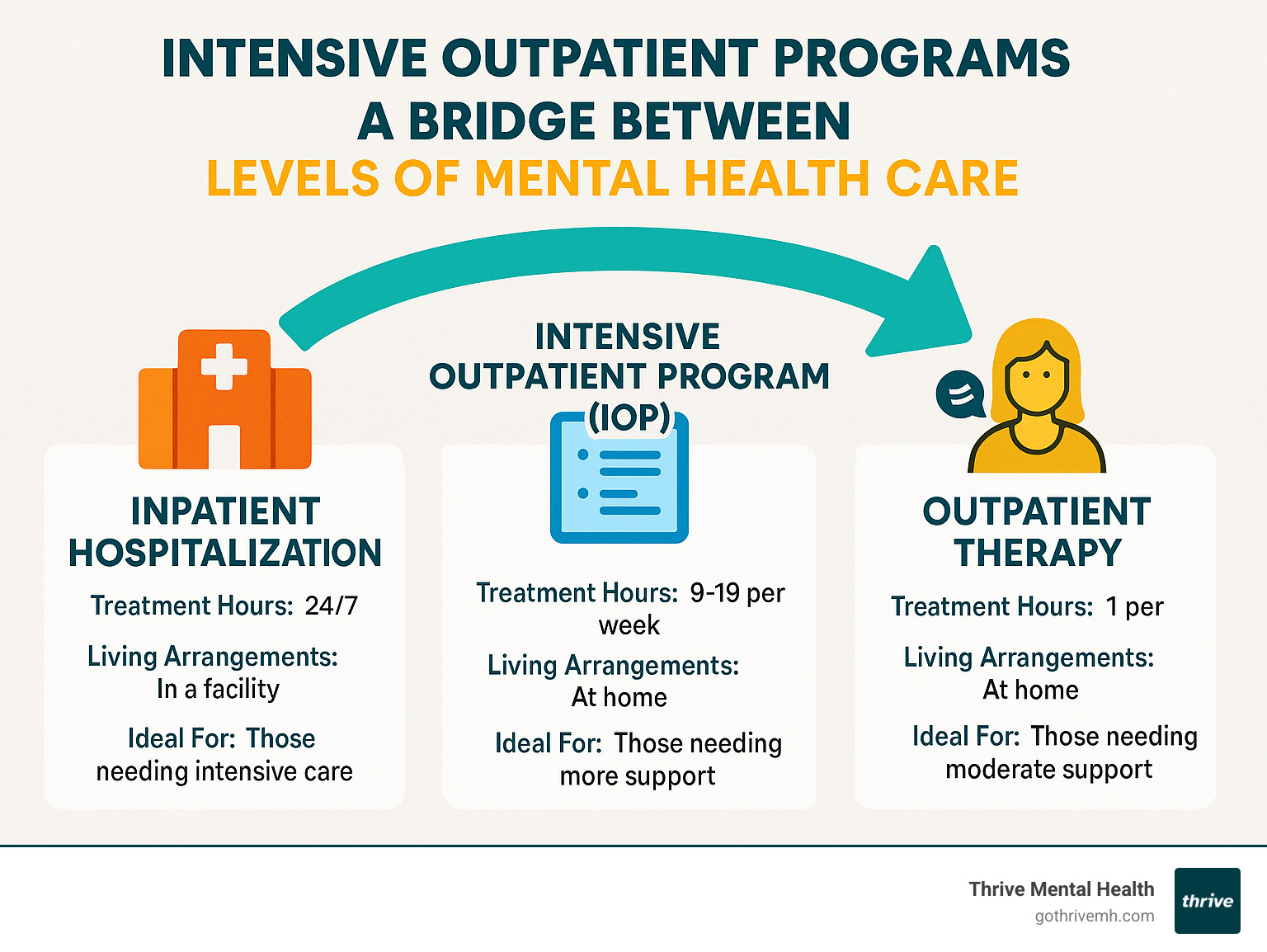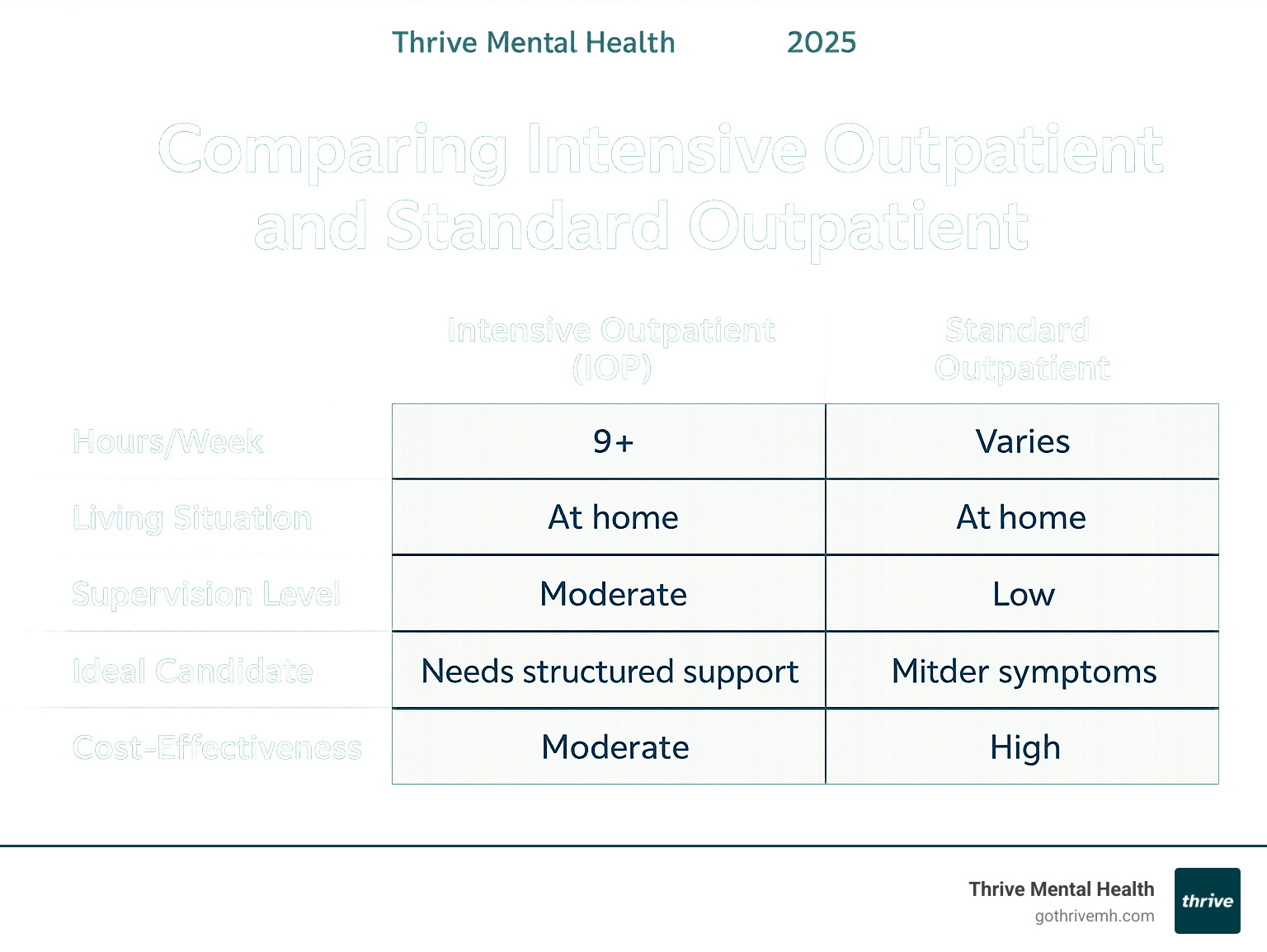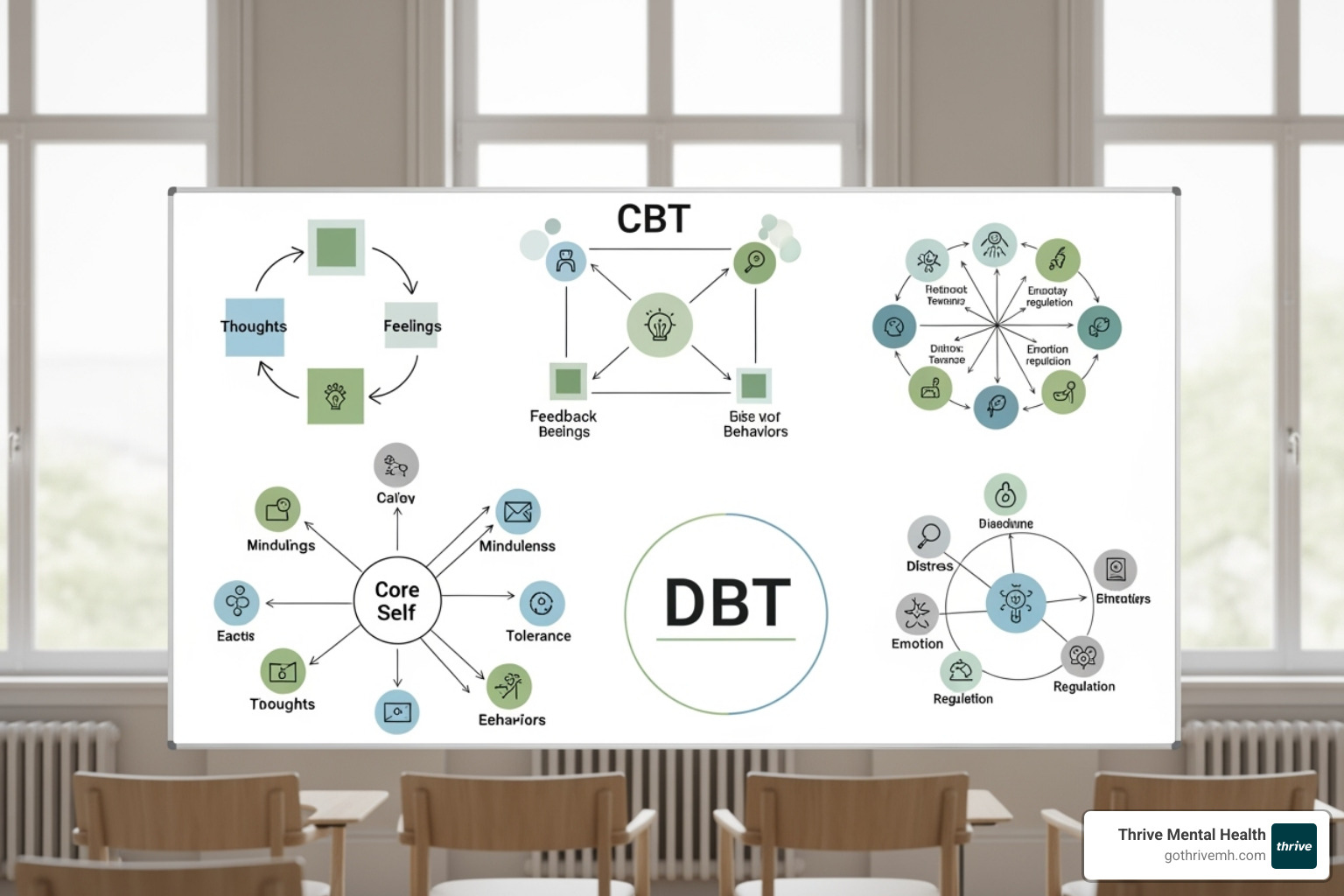Beyond the Basics: Understanding Intensive Outpatient Programs

What are intensive outpatient programs: Ultimate Guide 2025
What Are Intensive Outpatient Programs?
Intensive Outpatient Programs (IOPs) are structured treatment programs offering more support than traditional weekly therapy. Here’s a quick overview:
- Level of Care: More intensive than weekly therapy but less than residential care.
- Structure: 9-19 hours of programming per week, spread across 3-5 days.
- Flexibility: You live at home and can maintain your work, school, and family life.
- Purpose: Acts as a bridge from inpatient care or a step-up from standard therapy.
IOPs are ideal for individuals, especially busy professionals, who need significant support for conditions like anxiety, depression, or substance use disorders but do not require 24-hour supervision. The core benefit is flexibility; you integrate intensive treatment into your daily life. Research confirms their effectiveness, with studies showing IOPs are as effective as inpatient care for most substance use disorders, with 50-70% of participants reporting abstinence at follow-up.
As CEO of Thrive Mental Health, I’ve seen how IOPs provide the perfect balance of intensive care and real-world application, changing lives without disrupting daily routines.

Explore more about what are intensive outpatient programs:
At Thrive Mental Health, we are dedicated to explaining options like IOPs, helping you understand their structure and benefits to empower you to make informed decisions for your well-being.
The Typical IOP Schedule and Duration
A common question about IOPs concerns the time commitment. These programs are designed for flexibility.
Typically, an adult IOP involves at least 9 hours of treatment per week (up to 19 hours), usually in 3-hour sessions held 3-5 days a week. This structure is intensive yet manageable alongside work or school. The total duration varies based on individual progress, ranging from 4 to 12 weeks or more, custom to clinical needs as guided by the American Society of Addiction Medicine (ASAM) Criteria.
At Thrive Mental Health, we offer morning and evening programs to fit your schedule, available both in-person in Florida and virtually. Learn more about A guide to our Virtual IOP Program.
Core Components: What are intensive outpatient programs made of?
The effectiveness of IOPs comes from their multi-faceted approach. Here are the key components:

- Group Therapy: The cornerstone of IOP, providing a supportive peer environment to share experiences, learn coping skills, and reduce isolation.
- Individual Counseling: One-on-one sessions with a licensed therapist to address personal issues, set goals, and develop individualized strategies.
- Family Therapy: Sessions designed to improve communication, resolve conflict, and educate family members on how to best support the recovery process.
- Psychoeducational Groups: Educational sessions about mental health conditions, addiction, triggers, and recovery mechanisms to empower you with knowledge.
- Skills Training: Practical training in stress management, emotional regulation, communication, and relapse prevention for use in daily life.
- Case Management: A case manager helps coordinate care and connect you with community resources for needs like housing, employment, or legal issues.
- Medication Management: Includes psychiatric evaluation and management of medications to ensure both therapeutic and pharmacological needs are met.
- Relapse Prevention: Teaches you to identify warning signs, manage cravings, and create a solid aftercare plan to sustain long-term recovery.
IOP vs. Other Levels of Care: A Clear Comparison
Understanding where IOPs fit within the spectrum of mental health care is key. Treatment levels vary in intensity, allowing you to find the right amount of support.
- Inpatient/Residential Treatment: The highest level of care, providing 24/7 supervision and support in a facility. It’s for individuals in crisis or needing medical detox, requiring a complete pause from daily life.
- Partial Hospitalization Programs (PHPs): A step down from inpatient, PHPs offer intensive daily treatment (20+ hours/week) while you return home at night. It’s a blend of immersive care and home life.
- Intensive Outpatient Programs (IOPs): The ideal middle ground, IOPs provide more structure than weekly therapy (9-19 hours/week) but allow you to maintain your daily routine. You apply new skills in your real-world environment.
- Standard Outpatient Programs: The most flexible option, involving a few hours of therapy per week. It’s suited for milder symptoms or as ongoing support after more intensive treatment.

This system is designed for movement. Patients often use IOPs as “step-down care” after inpatient treatment or as “step-up care” when weekly therapy isn’t enough. At Thrive Mental Health, we help determine if our IOP or PHP is the right fit for you, meeting you where you are in your journey, whether virtually or in-person in Florida. Choosing the right level of care depends on your unique needs and goals.
For more information, explore More info about IOP at Thrive Mental Health.
The Benefits and Therapeutic Approach of an IOP
IOPs offer a unique blend of intensive care and real-world integration. Key benefits include:
- Flexibility: IOPs work around your schedule, allowing you to continue with work, school, and family life. This is crucial for professionals and students who cannot step away from their responsibilities.
- Cost-Effectiveness: By eliminating the costs of room and board associated with residential treatment, IOPs make intensive care more affordable. Most insurance plans cover IOP services.
- Real-World Application: You practice new coping skills in your actual environment, dealing with daily stressors as they arise. This immediate application helps solidify new, healthy behaviors.
- Peer Support: Group therapy connects you with others facing similar challenges, building a strong support network that can last long after treatment ends.
At Thrive Mental Health, our IOPs provide comprehensive, whole-person care. Our approach, available virtually or in-person in Florida, integrates multiple therapies to support your well-being. Learn more about The Benefits of an Intensive Outpatient Program.
Common Therapeutic Modalities Used in IOPs
The effectiveness of an IOP lies in its use of evidence-based therapeutic methods.

- Cognitive Behavioral Therapy (CBT): A foundational therapy that helps you identify and change negative thought patterns and behaviors. It’s a practical, goal-oriented approach that provides concrete tools for daily life.
- Dialectical Behavior Therapy (DBT): Especially useful for managing intense emotions, DBT teaches skills in four key areas: mindfulness, emotional regulation, distress tolerance, and interpersonal effectiveness.
- Motivational Interviewing (MI): A collaborative approach that helps you find your own motivation for change. It’s effective for overcoming ambivalence and strengthening your commitment to recovery.
These methods are often combined with other techniques like family therapy and trauma-informed care, custom to your needs. The SAMHSA guide on Clinical Issues in Intensive Outpatient Treatment offers more detail on these practices.
Conditions Treated and Ideal Candidates
IOPs are versatile and effective for a wide range of conditions. They are well-suited to treat:
- Substance Use Disorders: For medically stable individuals needing structured support for sobriety.
- Depression: Especially when weekly therapy isn’t enough to stabilize mood.
- Anxiety Disorders: Including GAD, OCD, and panic disorder, where the skills-based approach is highly effective.
- Other Conditions: Such as eating disorders, bipolar disorder, and PTSD.
- Dual Diagnosis: Integrated treatment for co-occurring mental health and substance use disorders.
The ideal candidate for an IOP is someone who needs more support than weekly therapy but doesn’t require 24-hour supervision. They should have a stable living environment and be motivated to participate in treatment. IOPs are effective as both a step-down from inpatient care and a step-up from standard outpatient therapy. At Thrive Mental Health, we offer specialized Intensive Outpatient Program Mental Health services to meet these needs.
The Evidence Base: Why are intensive outpatient programs effective?
The effectiveness of IOPs is well-supported by research. Studies consistently show that IOPs can produce outcomes comparable to more intensive and costly levels of care.
A 2014 meta-analysis, for example, found IOPs to be as effective as inpatient treatment for most individuals with substance use disorders. Key findings show that 50% to 70% of participants report abstinence at follow-up, with significant reductions in substance use.
Their effectiveness stems from a combination of an intensive therapeutic structure, the ability to apply skills in real-time, comprehensive services, and strong peer support. Economically, IOPs are a cost-effective alternative to inpatient care, delivering similar results for less, which is why many insurance plans favor them.
While those with the most severe conditions may require an initial inpatient stay, the evidence confirms that IOPs are a highly effective treatment for the majority of people. This research guides our commitment at Thrive Mental Health to providing care that delivers lasting results. For a deeper look at the data, see this Scientific research on the effectiveness of IOPs.
Finding Your Path: How to Choose the Right Program
Finding the right IOP is a crucial investment in your recovery. With options across Florida, from Tampa Bay to Central Florida, Thrive Mental Health offers both in-person and virtual programs to remove barriers to care.

When evaluating programs, consider these key factors:
- Accreditation and Licensing: Ensure the program meets state standards for safety and quality.
- Staff Qualifications: Look for licensed therapists with expertise in your specific condition.
- Treatment Philosophy: Find a program whose approach (e.g., CBT, DBT, holistic) resonates with you.
- Insurance and Accessibility: Verify your insurance coverage and consider the convenience of virtual options.
Ask potential providers these essential questions:
- What therapeutic approaches do you use?
- How are treatment plans customized?
- What is the program duration and scheduling flexibility?
- How are crises handled after hours?
- What does aftercare planning involve?
- Can you share outcome data or success rates?
A quality program will be transparent. If you’re considering virtual care, our Guide to Finding the Best Virtual IOP Options can help you make an informed choice. The goal is to find the right fit for your unique journey.
What to Expect from a Virtual IOP
Virtual IOPs have revolutionized access to mental health care, making it more convenient and less intimidating.
- Technology: All you need is a reliable internet connection, a device with a camera, and a private space. Our team helps with any setup.
- Engagement: Virtual sessions are highly interactive, using tools like breakout rooms and chat features to foster connection and participation.
- Group Dynamics: Many find it easier to be open and authentic from the comfort of their own space, connecting with peers from across Florida and beyond.
- Privacy: We use secure, HIPAA-compliant platforms and establish clear guidelines to ensure your confidentiality is protected.
- Accessibility: Virtual IOPs eliminate barriers like geography and commute time, making care accessible to anyone in Florida, from Miami to the Panhandle. Our Virtual IOP in South Florida is a prime example.
- Ideal for Professionals: The flexibility is perfect for working professionals, allowing them to attend sessions from a home office without disrupting their careers.
Virtual IOPs are not a compromise; they are a practical and effective way to get intensive support. To learn more, read our guide on What to Expect from a Virtual Intensive Outpatient Program.
Frequently Asked Questions about Intensive Outpatient Programs
Understanding the practical details of an IOP can help you feel more confident about starting treatment.
How much does an IOP cost and does insurance cover it?
IOPs are significantly more affordable than inpatient programs because they don’t include costs for room and board. Most major insurance plans, including employer-sponsored plans, Medicare, and Medicaid, provide coverage for IOPs. It’s essential to verify your specific benefits, deductibles, and any pre-authorization requirements. The admissions team at Thrive Mental Health can help you steer this process and verify your coverage for our Florida-based and virtual programs.
Can I work or go to school while in an IOP?
Yes. A primary benefit of an IOP is its flexibility. Programs are structured with morning or evening sessions to allow you to maintain your work, school, and family commitments. This also allows you to apply the skills you learn in real-time, which improves the treatment’s effectiveness.
What happens after I complete an IOP?
Completing an IOP is a transition, not an end point. A quality program provides a detailed, personalized aftercare plan to support your long-term well-being. This plan often includes transitioning to standard outpatient therapy, joining community support groups across Florida (like AA, NA, or SMART Recovery), and may involve continued case management. At Thrive Mental Health, we prioritize aftercare planning to ensure you have the tools and support for lasting success.
Take the Next Step in Your Recovery Journey
Your journey to better mental health can start now, without disrupting the life you’ve built. Intensive Outpatient Programs offer a unique balance of structured, evidence-based treatment and the flexibility to maintain your daily commitments.
IOPs provide intensive care that works with your life. Whether you’re a professional in Tampa Bay or an adult in Central Florida, an IOP can be the bridge to where you want to be, offering 9-19 hours of weekly treatment without putting your life on hold. The evidence shows that IOPs are highly effective, with outcomes comparable to inpatient care.
At Thrive Mental Health, we’re committed to making your path to recovery as smooth as possible. We offer expert-led, evidence-based care custom to your needs, available virtually across Florida or in-person. Our team is here to guide you, from verifying insurance to creating a personalized plan.
You don’t have to do this alone. If you’re ready to take control of your mental wellness, investing in a healthier future, we are here to help.